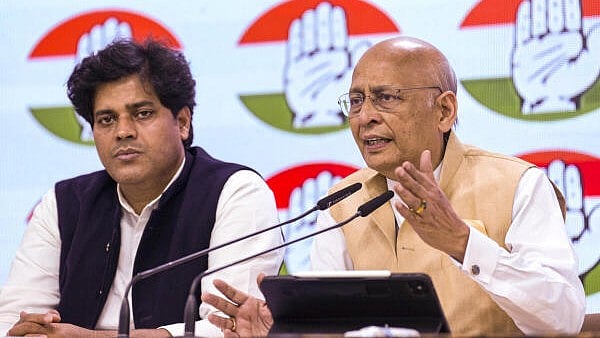
Congress MPs Abhishek Manu Singhvi and Imran Pratapgarhi address a press conference at AICC office, in New Delhi, on Thursday.
Credit: PTI Photo
New Delhi: As the Supreme Court recorded the Modi government’s assurance on Waqf management, Congress on Thursday said the apex court’s observations have brought into “sharp focus the very apprehensions” raised by the I.N.D.I.A bloc inside and outside Parliament.
General Secretary (Organisation) KC Venugopal said it has “opened the space for a broader and necessary” debate on the “legitimate concerns” surrounding the “hastily enacted” legislation. He claimed concerns were “neither adequately” addressed during the Joint Parliamentary Committee deliberations nor after the day-long discussion in Parliament.
“The Court’s pointed remarks raise serious Constitutional questions about the Act’s infringement on fundamental rights and lay bare its divisive undercurrents. The fight to defend the idea of India — inclusive, plural, and just — will continue, in the courts and with the people,” he said on ‘X’.
The Supreme Court recorded the government's assurance that neither waqf properties, including "waqf by user", will be denotified nor appointments of non-Muslims will be made to the central Waqf council and Boards till May 5.
Addressing a press conference with Congress Minority Department Chairman Imran Pratapgarhi, senior lawyer-MP Abhishek Singhvi said the amendments Waqf law is “not reform but a retaliation”, which is “meticulously scripted, strategically timed and Constitutionally questionable”.
“It is a bold ambition to control. Religious autonomy is reduced to State control. It is not about improving institutions but infiltrating, controlling and closing of minority institutions,” he said adding the contentious amendment Act “amputates” the fundamental right of freedom to religion.
He said they were there not to defend just one community but Constitutional principles, which “cannot be sacrificed at the altar of majoritarian
Referring to the provision of inclusion of non-Muslims in Waqf Council and Waqf Boards, Singhvi said a Board with token Muslim representation would mean “appropriation. It is a message that minority institutions are fair game for State take over”.
He also asked whether Muslims are part of the management of Hindu temples. Singhvi said 12 out of 22 members in central Waqf Council and seven out of 11 members in state Waqf Councils can be non-Muslims under new law besides the CEO of Boards.
The senior Congress lawyer pointed out that the new amendments abolish the provision for ‘Waqf by user’.
Pratapgarhi said, “we are hopeful that we will get more relief in the next hearing, because this was an attack on the core of the Constitution. Therefore, this decision is a victory for the Constitution. In the days to come, the court will provide more relief and will stop the government's conspiracy.”
